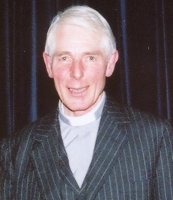The Rev'd Julian Barker
 Julian Barker retired in October 2003. He was Vicar of Repton and Foremark for 21 years, and also for the last two years, Priest in Charge at Newton Solney.
Julian Barker retired in October 2003. He was Vicar of Repton and Foremark for 21 years, and also for the last two years, Priest in Charge at Newton Solney.
They were busy years: they included five years as Rural Dean of the Repton Deanery, service on a number of Diocesan Committees when Julian's independence of mind and intellectual gifts may have been regarded by the Diocesan Authorities as mixed blessings. He also served as Chaplain to two High Sheriffs of Derbyshire, as Chaplain to the Drapers Livery Company in the City of London, as a Governor of Kirkham Grammar School in Lancashire and as a member of the Committee of the East Midlands Clerical Training Course conducted by Nottingham University.
Julian trained as a priest at Wescott House, Cambridge. After ordination he became a curate at St Mary's Stafford followed by a period as tutor at St Augustine's, the theological college of the Dean of Canterbury. He then became Chaplain of Clare College, Cambridge. His last appointment before Repton was as Vicar and then Rector of the Raveningham group of parishes in rural Norfolk.
Before training for the priesthood Julian, who had been at school at Sedbergh, did his National Service as a subaltern with the Suffolk Regiment - engaged in anti-terrorist operations in Cyprus. He then graduated from Magdalene College, Cambridge.
It is apparent that with this background he might well have sought and attained high office in the church. However he felt that the real task and challenge for the church is in the parishes and this is where he chose to direct his life's work.
A lover of the countryside and of traditional country pursuits, Julian was well fitted for a country parish. The large vicarage in Repton, with its equally large garden - and he was a keen gardener - was appropriate for his family life, for he was a proud father and grandfather. Yet personal pleasure and relaxation with his family were subordinated to the needs of his parish and his parishioners.
Early communion and working breakfasts with clergy from both the Church of England and other denominations were regular features of his life. Meetings of the Church Council and many other groups and committees were conducted in a family atmosphere around the vicarage fire. The preparation of parishioners and those outside the parish (for he was generous with his time) for baptism, confirmation and marriage; holy communion at home for the sick and elderly; hospital and home visits to comfort the sick, the dying and the bereaved; the teaching of enquirers' groups - all these tasks were carried out with kindness, patience and good humour. His sermons and talks were always been of the highest quality, many outstandingly so, and will be long remembered. Julian gave selflessly to the Christian and secular life of his parishes.
You may ask what faults this paragon possessed? It has to be admitted that there was a certain impatience, even amounting to anger on occasions, with the bureaucrat and the bureaucratic mind. His filing system was a maelstrom of paper deposited as though by a great storm upon his desk, yet it usually produced after a few anxious moments, in an almost miraculous manner, the piece of paper required.
Julian saw the parish church as a place where there should be diversity of services to provide for the broad stream of parishioners. Links with other churches were strengthened and the relationship with the United Reformed Church in Repton was particularly valued.
His legacy was a lively, friendly, motivated and well organised church, balanced in its forms of worship, conscious of the formidable challenges ahead yet with the will and determination to confront them.